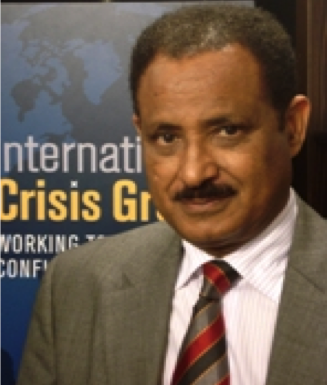The recently closed International Association of Business Communicators’ EuroComm 2013 in Brussels has been, by all accounts, a hugely successful event. Months of preparation led up to three days of intense engagement, lively discussion, friendly disagreement, and – in the best possible sense – disruption. In fact, so successful was the event that debriefing in a concise way, and even highlighting some pre-eminent ideas or themes, is probably impossible; so expect a few more posts from me on the subject of this year’s EuroComm in the coming weeks and months. However, I have to begin to make sense of it all somewhere, and from the wealth of inspiring stories and input from the speakers and participants, I feel that I have to begin with the quite remarkable contribution of Andebrhan Giorgis, former freedom fighter and ex-Eritrean ambassador (now there’s an arresting combination you don’t often find on a CV!).
Andebrhan was my neighbour for many years and I always thought that he had a fascinating story to tell. However, I wasn’t exactly sure how this particular audience would respond to him. During the event, I saw that he connected with them on a practical and very emotional level, and no wonder.
Andebrhan told us about his privileged upbringing in Eritrea and the United States, and how he left the comfort of the US, where he was studying for a PhD at Harvard, to join the Eritrean fight for independence from Ethiopia. He actually fought in the bush, and eventually, perhaps inevitably given his educational achievements, became the official communication spokesperson for the freedom movement. Their struggle was eventually triumphant – a classic story of David and Goliath, given the comparative size of Eritrea and Ethiopia – but after a heady triumph, a slow and painful process of decline and disillusionment began.
The winners of the revolution took over power, as they would of course, but gradually they refused to share that power with dissenting voices. Anderbrhan himself, always keen to offer his views, found that he became increasingly isolated during this period. After rebuilding Asmara University from scratch, he got thrown out of his job; he was asked to start a national bank, but it wasn’t long before he disagreed with the president of Eritrea; and finally, after accepting a more remote position as ambassador, he found that he was cut off from power completely. A fascinating – possibly unique – autobiography in its own right.
But Andebrhan was keen to highlight how his personal story had definite lessons for the EuroComm audience. One particular analogy he drew – between his experiences with unyielding authority figures and the modern CEO who obsessively wants to control what can’t be controlled and refuses to accept criticism or dissent – had me and many others nodding in immediate agreement. Just like the people in power that Andebrhan dealt with, the domineering CEO can stop listening to the voice of constructive opposition and surround himself only with those who are in agreement with him; the collapse of communication can end up with the naked Emperor leading his company into increasing isolation and bankruptcy.
Contrary to this stifling and ultimately disastrous attitude, I firmly believe that engaged dissent, structured conflict, constructive disagreement and disruption (note all those qualifying adjectives: they are important!) are critical for a successful business and for a healthy society. Our job as communicators is not to shut down or avoid dissent and disagreement, but to actually release these forces and channel them in positive ways. I know from my own experiences that if dissent and disagreement are allowed to occur spontaneously and naturally, they can produce beneficial changes. I would go further than this and say that only those of us who are serial dissenters are fully engaged with our surroundings, and what’s more, we pay attention to what we are doing wrong and look to change it.
Andebrhan Giorgis’ own story may arguably have had an unhappy ending, but if we all take only one thing from his memorable appearance at EuroComm 2013, let it be that Communication (with a capital “C”) is not just about selling mere products: it is something that can change our lives. Let’s not forget that.


Leave a Reply